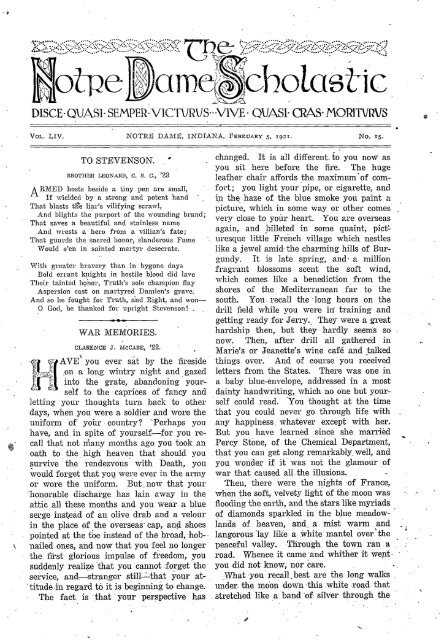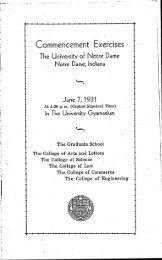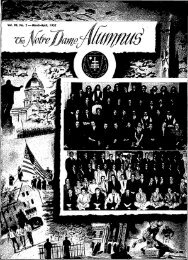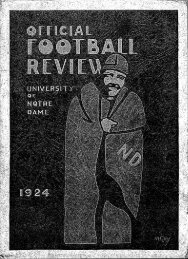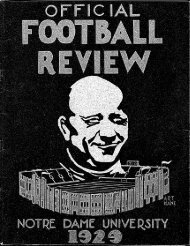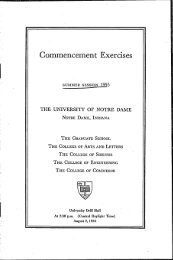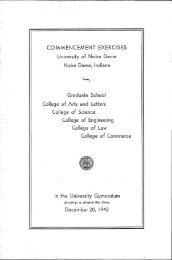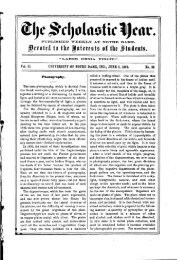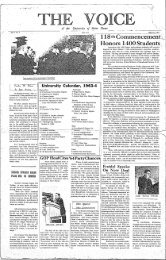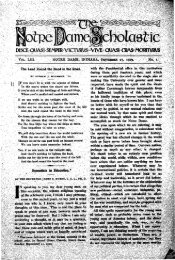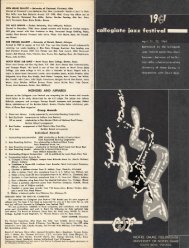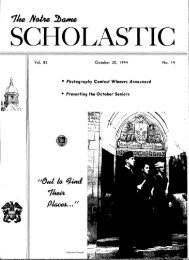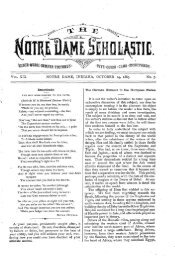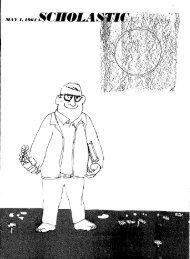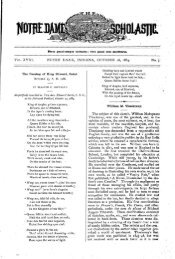Notre Dame Scholastic, Vol. 54, No. 15 -- (p. 249) 5 February 1921
Notre Dame Scholastic, Vol. 54, No. 15 -- (p. 249) 5 February 1921
Notre Dame Scholastic, Vol. 54, No. 15 -- (p. 249) 5 February 1921
Create successful ePaper yourself
Turn your PDF publications into a flip-book with our unique Google optimized e-Paper software.
.**••..••*•*•<br />
aiDegcbolastic<br />
.i.>-."5>...^rf.'f'--li.<br />
DISCE-QUASI-SEMPER-VICTVRUS-VIVE- QUASI- CRASJHORITVRVS «<br />
VOL. LIV. NOTRE DAME, INDIANA, EEBRUARY 5, <strong>1921</strong>. <strong>No</strong>. <strong>15</strong>.<br />
TO STEVENSON. '<br />
BROTHias LEONAKD, C. S. C, '23<br />
A RMED hosts beside a tiny j)en are small.<br />
If Avielcled by a strong and potent hand<br />
That blasts tile liar's vilifying scrawl,<br />
And blights the purport of the wounding brand;<br />
That saves a beautiful and stainless name<br />
And wrests a hero from a villian's fate;<br />
That guards the sacred honor^ slanderous Fame<br />
Would e'en in sainted martyr desecrate.<br />
V7ith greater bravery than in bygone days<br />
Bold errant knights in hostile blood did lave<br />
Their tainted honor, Truth's sole champion flay<br />
Aspersion cast on martyi-ed Damien's grave.<br />
And so he fought for Truth, and Eight, and won—<br />
0 God, be thanked for upright Stevenson! .<br />
* • »•<br />
WAR MEMORIES.<br />
CLARENCE J. MCCABE, '22.<br />
I M<br />
f| 4^ AVE' you ever sat by the fireside<br />
fc|_J?| yS\ on a long wintry night nigi and gazed<br />
"^ 11 into the grate, abandoning abanc your-<br />
self to the caprices of fancy and<br />
letting your thoughts turn back to other<br />
days, when you were a soldier and wore the<br />
uniform of yolir country? 'Perhaps you<br />
have, and in spite of yourself—^for you recall<br />
that not many months ago you took an<br />
oath to the high heaven that should you<br />
survive the rendezvous with Death, you<br />
would forget that you were ever in the army<br />
or wore the uniform. But.now that your<br />
"honorable discharge has lain away in the<br />
attic all these months and you wear a blue<br />
serge instead of an olive drab and a velour<br />
in the place of the overseas' cap, and shoes<br />
pointed at the toe instead of the broad, hobnailed<br />
ones, and now that you feel no longer<br />
the. first glorious impulse of freedom, you<br />
suddenly realize that you cannot forget the<br />
service, and—stranger still-^that your attitude<br />
in regard to it is beginning to change.<br />
The fact, is that your perspective has<br />
changed. It is all different-to you now as<br />
you sit here before the fire. The huge<br />
leather chair affords the maximum "of comfort;<br />
you light your pipe, or cigarette, and<br />
in the haze of the blue smoke you paint a<br />
picture, which in some way or other comes<br />
very close to your heart. You are overseas<br />
again, and billeted in some quaint, picturesque<br />
little French village which nestles<br />
like a jewel amid-the charming hills of Burgundy.<br />
It is late spring, and- a million<br />
fragrant blossoms scent the soft wind,<br />
which comes like a benediction from the<br />
shores of the Mediterranean far to the<br />
south. You recall the long hours on the<br />
drill field while you were in' training and<br />
getting ready for Jerry. They were a gTeat<br />
hardship then, but they hardly seems so<br />
now. Then, after drill all gathei'e'd in<br />
Marie's or Jeanette's wine cafe and talked<br />
things over. And of coui'se you received<br />
letters from the States. There was one in<br />
a baby blue-envelope, addressed in a most<br />
dainty handwriting, which no oiie but yourself<br />
could read. You thought at the time<br />
that you could never go through life with<br />
any happiness, whatever except with her.<br />
But you have learned since she married<br />
Percy Stone, of the Chemical Department,<br />
that you can get along remarkably well, and<br />
you wonder if it was not the giamour of<br />
war that caused all the illusions. .<br />
Then, there were the nights of France,<br />
when the soft, velvety light of the moon was<br />
flooding the earth, and the stars like myriads<br />
of diamonds sparkled in the blue meadowlands<br />
of heaven, and. a mist warm and<br />
langorous lay like a white mantel over the<br />
peaceful valley. Through the town ran a<br />
road.. Whence it came and whither it went<br />
you did not know, nor care.<br />
What you recall, best are the long walks<br />
mider- the mobn down this white road that<br />
stretched like a band of silver through the
2^6 '^e Hotve 6ame Seholasci'c<br />
peaceful valley, finally losing itself beyond<br />
the hills. With you walked one of the<br />
charming girls of France—at least you said<br />
that she was charming. At any rate, she<br />
was Juliette, the daughter of the man in<br />
whose house you were billeted, and she is<br />
certainlj'- deserving of all your kindest con-<br />
• siderations as long as you live. Many and<br />
many a time when homesickness and yearnings<br />
for other days overwhelmed you, she<br />
acted as a good angel to you in trying-to<br />
cheer you up in her own sweet way. While<br />
you walked she tried to tell you in her mixed<br />
French and English all about a little French<br />
maid who lived years and years ago and<br />
tended the sheep on the sunny hillsides; and<br />
how she had a vision, in vdiich she was<br />
told she should lead the armies of France<br />
when the day would come for the country's<br />
deliverance; then how .when she had freed<br />
her beloved country she was rewarded by<br />
being burned as a witch by the English.<br />
Yes, she told you all about Joan'of Arc.<br />
About all you said during the entire walk<br />
was "oui, oui," which was about the full<br />
extent of your" French vocabulary in those<br />
days.<br />
^^%ell at length, you returned to the oldfashioned<br />
French home and bade her goodnight,<br />
yon remember that she plucked a<br />
crimson rose and pinned it to your overseas<br />
cap, and that then a look came into her<br />
beautiful dark eyes which somehow told of<br />
a love, needing but a word to fan it into a<br />
flame. You have often wondered how this<br />
little affair would have ended had j'-ou remained<br />
there. But you vnll never know,<br />
for on the following day your regiment was<br />
ordei'ed to the front, and you never saw<br />
Juliette, the lij:tle French maid, again.<br />
<strong>No</strong> doubt she is still in the quaint, old<br />
home mtli the roses climbing over the endows.<br />
\^%en the moon rides high and the<br />
wliite'road runs beneath it, her memoiy<br />
recalls another night just like this when you<br />
were with her; deep in her heart she.is.<br />
sorry that you never came back; and her<br />
eyes, are wet "^^dtli tears as she wonders<br />
,whether you were killed in the battle, or<br />
sur\aved and long ago returned to yom- oA^m<br />
xjountry, forgetting her; forever. Ah, Juliette,<br />
you shall never be forgotten. Two<br />
-million Americans have brought home the<br />
memories of girls like jw, aiid though you'<br />
may never know it, you mil always be one<br />
of the sweet flowers that sprang into blossom<br />
through the ashes and tears of the Great<br />
War.<br />
^^1len you arrived at the froiit you began<br />
to realize the a^svful destruction of war. All<br />
around you were villages and to^^ms laid in<br />
ruins. The very ground you walked on was<br />
poisoned and torn to pieces by shrapnel and<br />
high explosives. The white trunks of trees,<br />
hundreds*and hundreds of them, gnarled,<br />
twisted, and splintered, looked weird and<br />
ghost-like under the full moon, or loomed up<br />
suddenly out of the darkness like huge guideposts<br />
pointing towards the invaders who had<br />
despoiled them.<br />
You saw the refugees' rushing from their<br />
homes. You recall them as they passed along<br />
the road, most of them old men and women,<br />
with a sprinkling of middle-aged matrons<br />
with babies at their brests, all of them<br />
carrying bundles over their drooping<br />
shouldei's, a few provisions of food or clothing<br />
hastily gathered for the flight. Others<br />
drive before them cows or herds of bleating<br />
goats. But what you remember best is the<br />
piteous, appealing lopk from the eyes of the<br />
old, and the flash of admiration in the dark<br />
eyes of the young women—admiration because<br />
they sensed jn you the champions of<br />
their cause. Dowii in their frightened'<br />
hearts, hope stirred and gave them new<br />
courage.<br />
You see the wheat fields of the Marne<br />
waiting to be harvested. ^The yellow grain<br />
ripens and waves in the passing mnd. Mil-<br />
'lions of poppies thrust their crimson heads<br />
above the golden grain; but ^the reaper is<br />
presently to pass over that ground. You see<br />
those same fields plowed with steel missiles,<br />
the wheat crushed and broken to the ground,<br />
and the poppies stained with, a redder red<br />
than their o^vn.^ The place is rotten with<br />
dead men; green, clumsy legs, high-booted,<br />
lie sprawled along the river. The trunks<br />
are bmied in, the sucking mud, resembling<br />
half-filled sandbags, and naked sodden but- .<br />
tocks, mats of hair, bulged and clotted heads<br />
sleep in the plastering slime.<br />
You lie under the fierce.German attack,<br />
chilled by nigiit and burning by day.<br />
Finally, you see their ranks .waver, break,<br />
then dissolve under your repeated,counterattacks.<br />
, You cross the Marne, and, in a
series of battles, which for fierceness and<br />
desperation on the part of the Germans have<br />
not been equalled, you drive them back from<br />
the valley of the river. - <strong>No</strong>r do you stop<br />
until your. colors are planted along the<br />
Vesle—and the homes in that garden spot<br />
of France thi-ough' which the Marne flows<br />
are forever safe from Prussian violence:<br />
You remember your buddie who used to<br />
be your bunkie. A quiet, fine sort of chap he<br />
was. You met him first in the early training<br />
days back iii the States, and you executed<br />
squads east and west with him many<br />
a long hour. Then, when you went overseas<br />
you had a bunk right across from his, qn<br />
the transport, and you were both seasick.<br />
You -were worse than he was, for you recall<br />
how he used to bring you a lemon or<br />
a dillpickle to help your poor stomach get<br />
back into condition. After arriving in<br />
France you both rode in those unforgettable<br />
sidedoor pullmans, mai-ked, "eight ho\;ses<br />
or forty men."<br />
Then came the day you will never forget,<br />
even if you live to be a century old,<br />
when you were charging across the brown<br />
fields of the Argonne. It was a general advance<br />
along the entire line, and your battalion<br />
was in the fore. Machine guns, and<br />
rifles kicked up little geysers of earth and<br />
sprinkled you with it from tip to toe, or<br />
whizzed past your, ear to-deal death elsewhere.<br />
Shrapnel broke over your head in<br />
keen ear-splitting explosions, its shattered<br />
pieces darting earthward with terrific force.<br />
High explosives come tow'ards you with<br />
the roar of an express train and many times<br />
. as fast, hitting the earth and exploding with<br />
a^vful efl'ect, the flying fragments darting<br />
here and there, cutting the vmiA until it<br />
shrieked -and moaned. It was dming this<br />
advance that you. saw your buddie falter,<br />
stop, and then fall to' the ground, mth a red<br />
stain oozing from ,a hole in the center of<br />
his head. He was dead when you reached<br />
him, and a flood of tears came to your eyes<br />
as you realized it. You muttered something<br />
about what would do if any prisoners fell<br />
into your hands, and then you left him there.<br />
Eyen now, after this lapse of time, your<br />
voice grows-husky aiid .you seem to look<br />
through a mist when you think of him. •<br />
. When you come to thilik about it all, some<br />
of the saddest and sweetest memories of<br />
'fefie Houre ©ame Scholascic 2=;l<br />
your life are of these days in the service.<br />
You perhaps never realized this before; but<br />
somehow or other you do tonight as you sit<br />
by the fire, and you see those memorable<br />
days passing in review through the smoke of<br />
your pipe. Of course you • remember the<br />
Rhine, too—^the dreamy Rhine with its<br />
legends as old as the hills that stand like<br />
sentinels above its waters. You see again<br />
the vineyards that cover the foothills along<br />
the Moselle. You rehearse the parades along<br />
the river front, the drills, and the horseshows<br />
you attended, and the picturesque old<br />
German home in which you were billeted.<br />
This time you did not awaken admiration in<br />
the dark eyes of Juliette, but when you came<br />
a pair of violet eyes looked at you in wonderment<br />
aiid half in fear. Before you left,<br />
however, Fraulein Louise showed something<br />
of the afliection of Mademoiselle<br />
Juliette. You were glad to leave the Rhine,<br />
but of late you would almost enlist in the<br />
army just to go back again. Yes, all the<br />
hard thoughts of service days are forgotten,<br />
and the mists enfold all that was not romance<br />
in that war.—^But see—^the log in the<br />
grate has broken in twain the swift ylay of<br />
the flames has subsided, the embers are pal-,<br />
ing, and only the gTay.ashes are left. The<br />
room is becoming chilled, and your pipe has<br />
gone out. You are returned to the world<br />
of reality—^memories are but the stuff of<br />
dreams.<br />
CARDINAL NEWMAN AS A MAN OF<br />
LETTERS.<br />
BROTHER ALPHONSUS, C. S. C.<br />
One of the most remarkable things in the<br />
career of John Henry Newman was that he<br />
attained the foremost rank among English<br />
prose-^Titers without ever consciously striving<br />
to acquire a literary style. Hut perhaps<br />
this very indifference to literary skill, for<br />
its own sake, is the secret of the "haunting<br />
beauty" of every page that Newman wrote^<br />
His only purpose in all that he published was"<br />
to make clear and effective ^the thoughts of<br />
his mind.*<br />
Another feature of, Newman's .writings,<br />
and one as noteworthy as his success, in attaining<br />
a perfect prose style, is the circumstance<br />
that despite the fact that his theme<br />
is nearly always a religious one, he has a
§52 '^e <strong>No</strong>ri'e 5ame <strong>Scholastic</strong><br />
human interest that fascinates the reader. stances, as a refutation of the unkind and<br />
The explanatio]! of this phenomenon is to be cruel accusation of untruthfulness, the<br />
attributed to the wealth of illustration in all "Apologia" reveals to the whole world in<br />
that Newman wrote, so that in his know the most, perfect form the life and charledge<br />
of the world he surpassed even such acter of the author. It was mth the great<br />
a versatile author as Thackeray. Both in est reluctance, as Ne-v^nnan tells us, that he<br />
matter and in form Cardinal Ne^vman is thus unbosomed himself to all men. But his<br />
unexcelled as an essayist.<br />
cause was so sacred, and the accusation of<br />
Who would think that in a work entitled his maligner was so far-reaching that there<br />
"Discussions and' Arguments" there might was indeed no other way of meeting the<br />
be found some of the most beautiful prose charges. After reading this exquisite auto-<br />
in English literature? The Cardinal's theme biographj'-, we can almost forgive the accuser<br />
is education. He is refuting the theories of when we remember that except for his mis<br />
Lord Brougham and others who maintained take we should never have had this revela<br />
that education of the mind is sufficient to tion of the rarest mind in modern letters.<br />
enable man to conti'ol his. appetites and his "The Idea of a University" contains some<br />
passions. So forceful and so fresh is the of Cardinal Ne-\^aiian's finest essays. -This<br />
expression of each phase of the thought is a work that should be familiar to all<br />
that the I'eader is enthralled more by the students of literature or philosophy. The<br />
rhetoric of the writer than by his argument. great author goes over the whole ground<br />
Cardinal Ne^^mian was preeminently a of knowledge and enunciates the principles<br />
rhetorician, not in the formal sense of that underlie the various sciences as well as<br />
that word, but in the endo^^mients of his general literature. Here the student will<br />
mind. In whatever he wi'ote, whether the find handy definitidns that mil be service<br />
theme lends itself naturally to embellishable at any time. And what is most remarkment,<br />
or is of a scientific character, the able is that although the subjects treated<br />
exposition of the thought is always pleasing. in this book are by their nature often ab<br />
When compared with other great essayists stract, the manner of their presentation is<br />
of the nineteenth centm*y, such as Arnold, made, by wonderful literary gifts of the<br />
. Carlyle, or Ruskin, Newman is evidently author, a marvel of beautiful diction.<br />
peerless. He is less artificial than any other Indeed, the reading and writing" of" the<br />
writers, less self-conscious, less manneristic, "Idea of a University" ought to be one of the<br />
in the form of his literary productions. greatest delights of every' student. "The<br />
They have suffered from the modern critics, Grammar of Assent," unlike the "Idea of a<br />
while Ne-^mian's fame has grown greater University," is a philosophical treatise on<br />
mth each generation.<br />
the logic of belief. The work has been,<br />
The chief works of Cardinal Newman, the styled the most original contribution to<br />
ones that have won for him his literary "philosophical thought in English. But like<br />
renown, are the "Apologia," Oxford "Uni all of^Cardinal Newman's books this volume<br />
versity Sermons," the "Essay 'on the De is also literature. In the "Grammar of<br />
velopment of Christian Doctrine," ,the Assent" we are struck by the same happy<br />
"Grammar,of Assent," and the "Idea of a and exact use of words that .is such a<br />
Universitj'-." ^ To these prose works must be marked characteristic of everything New<br />
added that unique poem on death, "The man penned. Of course, the reading of<br />
Dream of Gerontius." Althougii these pro this book requires great concentration of<br />
ductions are philosophical, yet the charm of mind if the reader is to grasp the author's<br />
the author's marvellous style has so en meaning. \'V^iile this is true, yet the reader<br />
riched them that they will live forever is often compelled to stop aiid admire the<br />
among the most cherished treasures of Eng beauty and clearness .with, which ideas are<br />
lish liter atm-e. • _ expressed. As a plilosophical"essay the<br />
We shall take three of these works for a "Grammar of Assent" is an excellent treatise<br />
brief appreciation. The most charming of for -any student of logic;to read. Here he<br />
all of; Newman's books^ is: the"A.pologia." 'will find original opinions on the subject of<br />
Written under tlie most, trying circum logic, which.will be an-invaluable supple-
ment to his previous studies. It seems quite<br />
remarkable that so few students of philosophy<br />
have ever read this volume of Newman.<br />
The wonderful charm of Cardinal Newman's<br />
writings is appreciated by all his<br />
"readers. But the most marvellous thing in<br />
connection with the greatest of English essayists<br />
is that so few educated persons have<br />
read any of his works. It mil be interesting<br />
to inquire into the calise of this neglect<br />
of Newman. We should naturally look for<br />
readers of Ne'v\Tnan in our Catholic colleges<br />
and universities. But strange to say, it is<br />
just here that the great- convert's writings<br />
are least known and appreciated. What is<br />
the explanation of the apathy of Catholics<br />
toward a writer whose genius is universally<br />
adviiowledged by literary critics? I shall<br />
venture to offer as a reason for this slighting<br />
of Newman's works their philosopical or<br />
theological character. Nearly .all of his<br />
books were mitten to promote the cause<br />
of the faith he had embraced. But the real<br />
secret of Newman's greatness as a writer<br />
is the union of the deep thought and exquisite<br />
literary expression. And one who<br />
cannot appreciate such an author WTites himself<br />
down, at once as shallow and ill-trained.<br />
IN SORIN HALL.<br />
A <strong><strong>No</strong>tre</strong> <strong>Dame</strong> student who had at length<br />
promoted himself to the dignity of a senior<br />
and had been assigned a room in Sorin Hall<br />
found the furnishings entirely inadequate to<br />
his style of life. Imbued with the idea that<br />
•the Lord and the University help those who<br />
help themselves, he instituted a thorough<br />
search of the premises for chairs, bookstands,<br />
and tables. A modicum of success<br />
attended his clandestine sallies into storerooms,<br />
trunks rooms, and recreation quarters.<br />
His efforts were rewarded by the acquisition<br />
of two chairs, a wash-stand, and<br />
a library table. <strong>No</strong> sooner had his welllighted,<br />
well-ventilated, " and well-heated<br />
room been further enriched with the loot<br />
than a laborious step was heard outside his<br />
door and the room resounded with a loud<br />
Imock. The unsuspecting senior issued a<br />
general invitation- of entrance. The door<br />
flew open and the head janitor of Sorin Hall<br />
stood on the threshold in all his majesty.<br />
'^e <strong><strong>No</strong>tre</strong> 5ame Seholascicr 253<br />
"Uh huh, pretty nice room you got here,"<br />
vouched the visitor.<br />
The fourth-year man flushed at the compliment<br />
and modestly admitted, "Oh it's<br />
pretty fair now, but it wasn't much until I<br />
fixed things up."<br />
"What you goin' to do with those three<br />
chairs ? ' I'spose you're a professor and goin'<br />
to have class in here."<br />
"Oh'no, no, Alphonse; I have been used to<br />
a- comfortable bed and I occasionally sleep<br />
on the three chairs instead of reposing on<br />
that medley of iron, wire, and calico over<br />
there in the corner."<br />
"Yas, I see. That's a good idea; ail I<br />
have to do is dust off the chairs in the morning;<br />
no bed to make—but my gosh, boy,<br />
where you get Father Hogan's libraiy<br />
table?"<br />
"Father Hogan's what?"<br />
"The rector's library table. He told me<br />
to save it for him 'specially. You can't have<br />
that."<br />
"\'Vlio's goin' to keep me from having it?<br />
Why, heavens above, man, .Sorin Hall rooms<br />
are.getting to be worse than those in the<br />
Y. M, C. A. Hotel." Why, where I am going<br />
to keep all these clothes, pictures, and books,<br />
and everything else?"<br />
Three days of service in Sorin Hall had<br />
made Alphonse a veritable mine of resourceful<br />
suggestion. "Use your suit case for them<br />
things. That's the way all the rest of the<br />
fellows do. I got to take this table—^I got<br />
to."<br />
."Don't /you touch that table. Take your<br />
hands off of it."<br />
"All right, all right; you stole the table,<br />
and I tell Father Hogan. He. fix you. all<br />
right, 5'"ou thief!"<br />
The door banged. At frequent intervals<br />
during the day the janitor and his elderly<br />
assistant engaged in loud and prolonged conversation<br />
just outside the culprit's door.<br />
The latter gathered from the trend of the<br />
rernarks that he would soon shake hands<br />
with the President and be requested to gTace<br />
the halls of another university. The next<br />
morning while the senior was in Washington<br />
Hall singing lustily, "It is^the fairest place<br />
on eai-th. Oh, <strong><strong>No</strong>tre</strong> <strong>Dame</strong>, Oh, <strong><strong>No</strong>tre</strong><br />
<strong>Dame</strong>!" someone who possessed a master<br />
key entered his domicile, decided that the<br />
effectiveness of the decorative scheme was
2<strong>54</strong><br />
not enhanced by the presence of the hbrary<br />
table, and accordinglj'^ removed the offending-<br />
article. <strong>No</strong>w the said senior keeps his<br />
toilet articles under hfs pillow. Three circular<br />
chalk marks on the floor indicate the<br />
seating accomodations of the establishment,<br />
and in lieu of heat there is an admirable<br />
draAving of a Colonial fireplace just opposite<br />
his desk. -T-E^MJMETT SAA^ENEY, '21.<br />
THOUGHTS.<br />
BY JUNIORS.<br />
Make every motion a promotion.<br />
Conduct is the exponent of character.<br />
Feed the flesh and you starve the spirit.<br />
Hard work v/ell done becomes a pleasure.<br />
Radical beliefs make a normal young man.<br />
Paint cannot make all old things look new.<br />
The good student carries his books in his<br />
head.<br />
Some men are so upright that they lean<br />
backward..<br />
Good nature and good sense are too seldom<br />
united.<br />
The reformer Avho breaks the ice gets a<br />
cold reception.<br />
For not a few persons the "eleventh" is<br />
the only hour.<br />
Our prejudices are our most formidable<br />
antagonists.<br />
All the world's a stage, but not all the<br />
actors get encores.<br />
Do not brag and people mil not expect so<br />
much of you.<br />
If you would never taste defeat enlist in<br />
the army of God..<br />
The real tragedy enables us to forget life's<br />
little irritations. .<br />
, You can drive a man to water, but you<br />
caiinot make him lilte it.<br />
•'Better late than never" is not very consoling<br />
at examination time.<br />
If you want to avoid trouble, think twice<br />
and then keep silent. "<br />
<strong>No</strong> man can be a friend of Christ who is<br />
not a friend to his neighbor. , , -<br />
Do not tempt yom* chilflren to doubt your<br />
veracity by telling them how good you, were<br />
when you were young. , •<br />
'^e <strong>No</strong>ure 5ame S'eholascie<br />
VARSITY VERSE. •<br />
"i'u GLAD TO KNOW YOU, JACK!"<br />
As I look back in reverie<br />
And scan the halls of memory,<br />
I meditate ujion the name<br />
Of every man at <strong><strong>No</strong>tre</strong> Bame<br />
Who looked me in the eye and said,<br />
"I'm glad to know you. Jack."<br />
I wish that I could see once more<br />
The men who left to go to war;<br />
For I knew them and they knew me—<br />
Thej'''re still my pals in memory.<br />
And I remember how they said,<br />
"I'm glad to know you, Jack."<br />
Of course I was a new man then,<br />
I hardly knew the older men;<br />
And. I felt shy at first, y'know.<br />
But they all boomed, "How are Ya"—so<br />
I fell in with the crowd and said,<br />
"I'm glad to know you. Jack."<br />
And soo;i I'll have to say good-bj'^e. . . .<br />
<strong>No</strong> longer Avill the campus cry,<br />
'How are you, Jack?" fling in my ears;<br />
But still I'll cherish all those years<br />
. When N. D. men shook hands and said,<br />
"I'm glad to know you, Jack."—w. O'K<br />
MY VALENTINE.<br />
Sweet rose with beauty dight,<br />
Of human form di\ane,<br />
The wide world would I giA'^e<br />
To say that you are mine.<br />
The faith that through your eyes.<br />
Shines brightly as a star.<br />
Illumines all my heart,<br />
And draAvs me from afar.<br />
Yet of thy greatness.<br />
May I not ask a sign.<br />
Do only ansAver this:<br />
Are you my Valentine?—J. T. B.<br />
To A MOONLIT CLOISTER.<br />
Castle of Aargins pearl-eyed like Selene,<br />
Each dusty day in loye Seraphic SAvathed,<br />
By night uplifted Avith the strong betrothed.<br />
Thy hearth hives fragrance like a bee's desmense!<br />
HoAv sweet the moonlight Awaps the stones in, peace.<br />
While autumn throbs in musing minstel trees;.<br />
Does AAane AA^ing from tliis soil-bereft of lees.<br />
Can. joy be quaffed here and the cup increase?<br />
A thirst they crave AAdio flay toil's rough-flagged<br />
life<br />
Embracing riches or at best a Avife. ...<br />
.All, sister,, hide thy heart's tranfixing thorn.<br />
We knoAV that rapture is of penance born!<br />
Christ, cruel Lover, SAAungs a stinging lash.<br />
Thy soul is bounded A\dth,His bleeding sash! »<br />
. / • : —M. E. w.
"PSYCHOLOGY"<br />
> CHARLES P. MOONEY, '21.<br />
On the hottest day of last summer in' a<br />
town of the sweltering Mississippi Valley<br />
five gentlemen of color were assembled in a<br />
stuffy room above a dilapidated barber shop.<br />
.The furniture of the room consisted of a<br />
wobbly table on three unsteady legs, several<br />
chairs made by cutting flour barrels halfway<br />
through the middle, a box of saw dust<br />
to be used in lieu of a cuspidor, and a drop<br />
light suspended over the table. On the rear<br />
wall was hanging a picture supposed to be a<br />
reproduction of the charge of the Ninth<br />
Cavaliy at San Juan Hill. The acrid odour<br />
of the cheap cigars was neutralized by the<br />
scent caused by the close grouping of the<br />
perspiring sons of Cain.<br />
Two days before this the negroes, all of<br />
whom were employees of a cottonseed oil<br />
company, had received their monthly wages.<br />
As is the custom with most of their race,<br />
they would not return to work until they<br />
had disposed of the fruits of their toil.<br />
Since the assembly was yet well supplied<br />
with capital, several daj'^s- would elapse<br />
before the company would again enjoy the'<br />
services of these leisurely workmen. Just<br />
at this time they were entertaining themselves<br />
in their third-hour of a poker game,<br />
the limit of which was twenty-five cents,<br />
with a ten-cent ante.<br />
After the game had continued for another<br />
hour, during which period nothing startling<br />
in the way of betting had occurred, the motion<br />
was made and carried that the limit<br />
be made fifty cents. The result of this<br />
change in the stakes was the summary elimination<br />
of two of the players. A few more<br />
hands were dealt and a third negro was<br />
pushed out. • This last withdrawal left only<br />
two, "Liver Lips" Johnson and "Pear Haid"<br />
Crump, contesting for the untimate ownership<br />
of the company's finance.<br />
"Pear Haid," although many dollars the<br />
winner, was nevertheless disgusted with the<br />
thought of a poker player of his skill having<br />
to spend so' much time at throwing the<br />
crowd into bankrutpcy, a feat whose accomplishment<br />
ordinarily consumed not half so<br />
much time. Since he regarded himself as an<br />
ace among African gamblers, it galled him<br />
to have this hitherto unknown and weazfened<br />
'5^e <strong>No</strong>tn^e ^ame S'eholascie r\ r' f<br />
-00<br />
negro an insurmouiitable obstacle between<br />
him and victory. However, no matter how<br />
skilled one may be, or may think himself<br />
to be, he is in the game of di-aw pov/erless<br />
unless he has some sort of hand. After his<br />
opponent had won ten ov more small pots,<br />
"Pear Haid" began to publish his inward<br />
discomfort. "Hit show do beat me," he<br />
grumbled; "ah ain't never 'fore seed no run<br />
of luck like sich as dis hyah ahse havin'.<br />
Yeh'd think they wan't nothin' in that deck<br />
of cyads but dooces and sebens. Somebuddy<br />
sho done cunjered me; ah ain't had a paih<br />
foh a week."<br />
"Well, ah ain't done so much mahself,"<br />
informed "Liver Lips." "Ahse winnin', but<br />
what is ah winnin' ? <strong>No</strong>thin' 'cept yoh ante,<br />
an' mebbe chew bits now and theii." ^<br />
"Oh, yoh craves action, does yoh, niggah?"<br />
challenged the other. "Thinks yoh's a bigtime<br />
gambler, huuh? Well, s'posin' foh yoh<br />
benefit, we jest makes dis hyah game wuth<br />
while. Foh all the money ahse makin', ah<br />
mought jest as well be wukkin'. Is yoh on.<br />
Liver Lips?"<br />
"Says which? "Liver Lips'- was outwardly''<br />
chary.<br />
"All says does yoh wanter take off the<br />
limit an' play pokah, show nuff pokali, er"<br />
keep up dis hyah jungle buzzard's game?"<br />
"Take it off. Big Shawtj'-. Ah ain't never<br />
yit been bluffed by no city niggah. What<br />
it takes to gamble, ah jest happens to have."<br />
Accordingly the limit became the ceiling.<br />
This, however, did not call for any sensational<br />
betting, since neither of the negroes<br />
were dramng any high cards. <strong>No</strong>r did it<br />
effect any great change in the luck of the disgruntled<br />
"Pear Haid." "Liver Lips" kept<br />
winning the pots methodically on small<br />
hands. To "Pear Haid" it seemed that there<br />
were no two cards alike in the deck. Only<br />
once did he manage to draw anything high<br />
enough to attempted a "raise." It was<br />
three sevens. True to form, "Liver Lips"<br />
"topped" him with thi^ee. eights. This loss<br />
had made a large dent in "Pear Haid's"<br />
dwindling pile. A hasty survey of his exchequer<br />
showed that there remained to him<br />
only ten dollars. At the rate things were<br />
going he.had about a half-hour to continue<br />
as participant in the game, unless the goddess<br />
of chance should desert "Liver Lips."<br />
But the goddess, whom some persons accuse
256 '^e <strong>No</strong>cre 6ame Seholascie<br />
of fickleness, was not even considering a<br />
temporary separation. This realization of<br />
his plight made "Pear" desperate. If the<br />
goddess would not come to him voluntarily,<br />
he would use the draft method.<br />
On the next hand "Liver Lips" opened the<br />
bet for a dollar, expecting to mn the ante;<br />
but "Pear Haid" chose to "stay in" and accordingly<br />
tossed a bill into the center.<br />
"How many cyads, niggah," he snarled.<br />
"Guiime three, and don't be so familiah,"<br />
demanded "Liver Lips."<br />
Then a brilliant idea penetrated "Pear<br />
Haid's" armour-plate skull. He weighed it<br />
and inspected it from all sides, before he<br />
decided that^t was practical. So he held<br />
three' pasteboards and took two from the<br />
deck. After a furtive glance at his hand, his<br />
ebony countenance merged itself into an<br />
eight-inch grin. He began fingering the<br />
remnants of his capital eagerly.<br />
"\\^iat yoli do. Liver?" inquired Pear<br />
Haid."<br />
"All bets a dollah."<br />
"\^niy don't j'-oli make hit a man's game?<br />
All sees yoli dollah and makes hit nine dollahs<br />
more, jest to drive out the chillun.<br />
Would make liit more, but ah ain't got hit.<br />
<strong>No</strong>w is j'^oh a pokali playah er jest a halid<br />
wukkin' country niggah?"<br />
This change of tactics on the part of his<br />
opponent caused "Liver Lips' " jaw to drop<br />
. some six inches in surprise. This was the<br />
first sign of any desire to plunge by "Pear<br />
Haid." "Liver Lips" concluded that he had<br />
better go slowly: "Pear Haid" must have<br />
something, for why should he risk his whole<br />
fortune at one time. Hopiiig to. find some<br />
enlighteimient on the situation, he studied<br />
his adversary's countenance. This, however,<br />
availed him nothing.<br />
"Well, naggah, is yoh or-ain't yo goin' ter<br />
bet?" taunted "Pear Haid." "Yoh can't<br />
I'arn auj'thing er-looking at nie. Yoli'se<br />
gotter pay to see mail cyads." ' .<br />
"Liver Lips" emitted a yawn, and nonchantly<br />
rah his hand into his. pocket and<br />
extracted therefrom a greasy wallet. All<br />
the while he stared at "Pear Haid," who<br />
in turn kept his eyes fixed on "Liver Lips."<br />
Once "Pear Haid" interrupted his gaze long<br />
enough 'to drop a prurient glance at the<br />
money in the middle of the table: Then he<br />
returned; liis attention tb watchin-g -his<br />
enemy's physiognomy. "Liver Lips" continued<br />
fingering his wallet undecidedly.<br />
Again "Pear Haid's" eyes rested upon the<br />
bills and silver constituting the pot—^whereupon<br />
"Liver Lips" suddenly pushed nine dollars<br />
to the center.<br />
"All calls yoh. Pear Haid," he announced;<br />
"show me yoh cyads if yoh can beat these<br />
three ladies alise got."<br />
"Pear Haid," collapsed. A vision of<br />
winged dollars drifted across his mind.<br />
"Liver Lips," after sweeping in the pot, took<br />
the cards from the temporarily paralyzed<br />
negro. The result of an inspection was a<br />
smile of satisfaction.<br />
"Some pokali playah," he cliided the inanimate<br />
"Pear Haid," "yoh is not. Ah knowed<br />
all the time that yoh didn't have notliin'."<br />
"How come?" asked "Pear Haid."<br />
"How come? Jest sikology, niggah. Yoh<br />
lookin' at that pot an' not bein' able to keep<br />
yoh eyes off'ii hit was er dead give-away<br />
that yoh was bluffinl' Yassah, ole silkogj'<br />
cost yoh nine bucks. 'Taint nothin' else but<br />
silkology."<br />
"Who am dis sikology yoh talks er-bout?"<br />
"'Tain't no pusson—chit's a. science. Look<br />
•hit up yohself. That's how ah found out<br />
erbout hit." • '<br />
Three daj'-s after he had been striiDped<br />
of his. honor and of. his fortune "Pear<br />
Haid," having enipied a truck of its oil barrels<br />
and moved them onto a platform, sat<br />
down to await the vehicle's retui*n with more<br />
cargo.. He soon noticed that he was seated<br />
next to his-conqueror, "Liver Lips." "Pear<br />
Haid" still resented the taunts of his rival<br />
after he had carried off the money." He<br />
looked at "Liver Lips" in disgust.<br />
"Say niggar," began "Pear Haid," "ahse<br />
got yoh figgered out as nothin' else but a<br />
do"svnright hah." -<br />
"<strong>No</strong>v,'" watch 'out cullud boy," threatened<br />
"Liver Lips"; "and 'splain yohself, 'splain ,<br />
yohself!" ' , .<br />
"Hit's erbout dis hyah_'see-kollogee."'<br />
"What erbout hit. Pear Haid?"<br />
"They ain't no sech word—'ca'se ah<br />
peeroosed the ole deectshuneery all the v/ay<br />
through the letter V from 'sabbytahyaii' to<br />
'systole', an' didn't s,ee no sigh, iiv yer 'seekollogee'.:.<br />
.Yoh jest'imade; that word/^up.<br />
Huli,-^see-kollogee!- Wliatiiahs you school-:<br />
niggahs is.'' - ..:^-;> -::;-• , •<br />
/^
]|otpe]panie§cholastic<br />
DISCE-QUASI-SHARPER-VICTURUS-Vivl- QU/XSI- CRAS-i^\ORlTVRVS<br />
-<br />
Published<br />
VOL. LIV.<br />
Entered as Second-Class Mail Matter.<br />
every Saturday during the School Terni<br />
UNIVERSITY OF NOTRE DAME.<br />
FEBRUARY 5. <strong>1921</strong>.<br />
BOARD OF EDITORS.<br />
ALFRED N. SLAGGERT, '21 M. JOSEPH TIERNEY, '21<br />
WALTER M. O'KEEFE, '21 EMMETT SWEENEY, '21<br />
MORRIS STARRETT,'21 EDWIN W. MURPHY,'23<br />
HENRY STEVENSON '21 VINCENT ENGELS, '23<br />
EDWARD B. DEGREE,"23 J. "W. HOGAN, C.S. C, '22<br />
LEO R. WARD, C.S. C,'23 FRANK WALLACE, '23<br />
R M. MuRCH, C. S. C,'23 H. W. FLANNERY, '23<br />
CHARLES P; MOONEY, '22<br />
Ultimately the difference between culture<br />
and average ignorance lies in the point of<br />
view: as we climb higher up the Pierian<br />
peaks, the ideas<br />
GILBERT CHESTERTON AND ^ and ideals of<br />
THE COLLEGE MAN. the other fellow<br />
are revealed<br />
to -US more aiidmore- clearly while apparently,<br />
our own powers depreciate, as<br />
we strive to develop them. As a truer<br />
. impression of the man at our elbow forms<br />
itself, a sincere respect for him rises in<br />
us—a respect that is most forcibly expressed<br />
in the word, democracy.. That is<br />
why the really intellectual man is the sincerest<br />
supporter.of the popular ideal. Perhaps,<br />
too, it explains why G. K. Chesterton,<br />
one of England's topmost literati, is England's<br />
leading democrat. To speak of an<br />
Englishman, • especially one who represents<br />
the highest literary stratum, as a democrat,<br />
is. ordinarily either humor or satire. Like<br />
the device he is so adept- in manipulating,<br />
however, Mr. Chesterton is himself a para^<br />
dox.. He is the oracle of liberty in a land of<br />
oppressors. In fact, democracy is the burden<br />
of .all Chesterton's literature; it is<br />
the essence of his genius. Underneath his<br />
trappings—the bemldering paradox, the<br />
epigTammatic tang, the glitter of his style—<br />
even in his most e'ccient-ric humor, is sensed.<br />
'^e HouvQr. 5ame S'eliolascie 257<br />
at<br />
NO<br />
the<br />
<strong>15</strong>-<br />
that friendly sjinpathy and esteem for hisfellow,<br />
that is tyi^ical of democratic culture.<br />
Stevenson had it; so did Dickens and Scott<br />
and the other genial masters. In this as in<br />
eveiy wrinkle of his unique temperament<br />
Chesterton is a remarkable figure in the<br />
eyes of the college man. The sparkle of his<br />
"writing has attracted unnumbered disciples,<br />
although nobody has yet been able to imitate<br />
or parody him. For the genuine admirer<br />
of the delightful Englishman, however, these<br />
marvellous mannerisms are not deluding.<br />
It is a precept of democracy that inspires<br />
the genius of the man by which the subtle<br />
student is fascinated. For in the typical<br />
American university, not excluding our own,<br />
where intellectual pride or personal pedantry<br />
is the bane of existence, the portly form of<br />
Gilbert Chesterton is a suggestion to laugh,<br />
and it is men's mirth that makes the world<br />
akin. —E. w. M.<br />
The ciuestion for debate at <strong><strong>No</strong>tre</strong> <strong>Dame</strong><br />
this year is whether the national • government'<br />
should own and operate all the coal<br />
mines in the United States.<br />
SUPPORT THE Coal is a natm-al resource of<br />
. DEBATERS. supreme importance, which<br />
the world sees more clearly<br />
as all industry has come to depend upon it.<br />
Though the United States has gxeat stores<br />
of this commodity and produces more of it<br />
than all other countries combined, our supply<br />
is not unlimited. The present system of unregulated<br />
private ownership and operation,<br />
with its cut-throat competition and at least -<br />
one huge instance of monopoly, is charged<br />
with monstrous and intolerable abuses, chief<br />
among which is that the supply is being decimated.<br />
Whether these abuses are remedia-'<br />
ble with the retention of the present system,<br />
or are inherent in it; whether.public.control -<br />
is practicable, whether oiu' government, can<br />
successfully engage in business; whether the<br />
adoption of the proposal would be a decided<br />
step toward Socialism; whether the rather,<br />
general collapse of public ownership and<br />
operation throughout the w:orld has any<br />
bearing on this-question:—these are. a few<br />
of the fundamental problems which the<br />
would-be debater must meet- squarely. And<br />
at, least; certain of them are problems the<br />
mastered .solution of which iwould a decided<br />
asset to aiiy Catholic.student. . .—L. R. V. '
258 '^e <strong>No</strong>ure 6ame ^cholascie<br />
A number of years have passed since a<br />
certain group of ^\T.-iters first began to call<br />
public attention to the extraordinary success<br />
DOES EDUCATION<br />
PAY?<br />
obtained by college<br />
men. They showed<br />
how ninety one and a<br />
half per cent of all<br />
wealthy persons had studied in college, and<br />
dreAV this shiftj'- conclusion: "Since most<br />
most big men have been at college, a college<br />
com'se is all that is necessarj'- for success."<br />
We are inclined to believe that the wellmeaning<br />
gentlemen who created this propaganda<br />
should be choked or at least throttled.<br />
Their voluminous reports have sent<br />
to the colleges of the country a horde of<br />
misfits for whom the only goal of Education<br />
is a sort of fantastic alchemy. To these,<br />
they have communicated the belief that there<br />
is subtle magic in a college degree which<br />
draws _ to the bearer casks of j'-ellow gold.<br />
Of course, they have been guilty of deception.<br />
<strong>No</strong>w we are being favored A\dth the<br />
opposite variety of officious nonsense. It<br />
has been discovered by various shrewd reporters<br />
that a column of space may profitably<br />
be devoted to showing that the average<br />
owner of a college-diploma must,begin on<br />
fifteen dollars a week; that business directors<br />
are inclined to frown upon him by<br />
reason of his aversion from daily labour and<br />
his intense devotion to good-looking stenographers.<br />
The question is openly put, "Does<br />
Education Pay?"<br />
The answer is, of com'se, that no four<br />
years of anji;hing -vsill pay unless work has<br />
been done in them. Education has suffered<br />
itself to be misled from the old idea that<br />
something more could be draA^ai from a man<br />
than a giggle or a guffaw. It is beginning<br />
to understand now that the only thing which<br />
matters to a man is that "when life is over<br />
he shall be satisfied \^itli his use of it; satisfied<br />
that he has successfully invested not only<br />
his money but himself. _v. E.<br />
A "man cannot be a girl's friend; he<br />
must be either sweetheart, enemy, or mere<br />
acquaintance.<br />
Children think in straight lilies; it is only<br />
"more intelligent" men and women who<br />
thinly in the roundabput way.<br />
IRELAND TO NOTRE DAME.<br />
The arrival of Miss Mary MacSwiney,<br />
sister of the martyred mayor of Cork, at<br />
<strong><strong>No</strong>tre</strong> <strong>Dame</strong> next Wednesday will be another<br />
bit of evidence to show that the University<br />
believes in keeping a well-informed eye on<br />
the Irish situation. We have not yet forgotten<br />
the visit of Eamon De Valera; and<br />
very likely we shall put this picture of our<br />
coming guest into our memory-books.<br />
BENGALESE BENEFIT SMOKER^<br />
Boxing, wrestling, a tribute to Coach<br />
Rockne, and a talk by Father O'Donnell featured<br />
the smoker arranged by Brownson<br />
Hall last Monday evening for the benefit of<br />
the Bengal Mission. A. hundred and fifty<br />
dollars will go to this mission as the result<br />
of the fii'st effort of the Bro^vnson boys in<br />
what they intend to make an annual affair.<br />
Brother Alphonsus, rector of Brownson<br />
Hall, and a resident of <strong><strong>No</strong>tre</strong> <strong>Dame</strong> since<br />
1884, delivered an interesting tribute to<br />
Coach Rockne in his speech on "The Rockne<br />
System." Sketching the academic and athletic<br />
work of the Coach from time he entered<br />
Brownson Hall twelve years ago until he<br />
became the peer of the football coaches<br />
in the country. Brother Alphonsus stated<br />
that the Rockne schoolof athletics is distinctive,<br />
already making its influence felt<br />
by graduates who are now coaching other<br />
collegeg and preparatory schools. He analygisd<br />
thfe "Rdclaie Syst^" into the coacfc, the
excellent moral type of the students whom<br />
he trains, and the system of interhall athletics.<br />
He said the greatest football teams<br />
of the school were those of 1909, 1913, and<br />
1920;-he predicted increasingly brilliant organizations.<br />
Charles De Roulet pinned Charles Ruble<br />
to the mat three minutes after the first<br />
wrestling bout of the evening was called by<br />
"Paddy" Granfield, boxing instructor at<br />
<strong><strong>No</strong>tre</strong> <strong>Dame</strong>. "Shorty" Lujan.and "Ed"<br />
Ashe went a fast draw of three rounds in an<br />
attempt to settle an old dispute for the bamtam-weight<br />
supremacy of the school. Frank<br />
• Cahill gave away under weight to Dave<br />
Hayes in four rounds of sensational milling<br />
which in rugged fighting and stealthy science<br />
rivalled professional talent. "Kid" Parker,<br />
the flashy Corby gxappler, had a man's job<br />
in fulfilling his contract to throw "Tom"<br />
Riley fought the first fall for nine minutes<br />
Riley fought the first face for nine minutes<br />
and was pinned for the second in six minutes<br />
of Vkdcked work. The star act of the evening<br />
brought together "Jimmie" Egan, "Wop"<br />
Aviles and "Jack" Lightner in two rounds of<br />
blindfolded boxing. Charlie Chapman might<br />
have learned much from these brave warriors<br />
who battled the air wildly or mixed<br />
three pairs of arms and legs in rough and<br />
tumble.<br />
Paul Breen, the eloquent young orator,"<br />
as chairman, presented the various speakers<br />
and players. "Eddie" Gottry and "Jerry"<br />
Hassmer gave good piano selections, and<br />
Grant Steimer's violin solos were heartily<br />
applauded.<br />
The most important event of the eveningwas,<br />
however, an address by the very Rev.<br />
Provincial. Opening his remarks, Father<br />
O'Donnell congratulated the Rector of<br />
Bro^\iison Hall and the young men themselves<br />
on their spirit of enterprise and<br />
of faith in arranging the evening's program<br />
for so worthy a cause. Explaining<br />
the history and meaning of the old log<br />
chapel on the campus, he brought home<br />
to his hearers the vitality of the missionary<br />
cause to-day and how it is of<br />
necessary interest to all who are truly<br />
Catholic. He touched on the needs of the<br />
missionaries and showed how far even fifty<br />
cents will go in India. In the course of his<br />
remarks, he paid a fine tribute to the young<br />
'Sfie <strong>No</strong>ure 5ame S'eholasuicr 259<br />
ladies at St. Mary's, who have done much<br />
and will do more for Bengal. He urged<br />
the students of <strong><strong>No</strong>tre</strong> <strong>Dame</strong> to emulate those<br />
of St. Mary's. Taking occasion of the nearness<br />
of Lent, Father O'Donnell showed how<br />
the old-time Catholic spirit of penance can<br />
harmonize very practically with the spirit<br />
of zeal for the foreig*n missions. In conclusion<br />
he touched lightly but impressively<br />
upon the other great means of helping the<br />
missions, that of giving one's self as a missionary.<br />
Out of the sound faith of to-day, he<br />
said he had no doubt at all that gTeat vocations<br />
would answer to the needs of the.<br />
missions once those needs are effectively<br />
made known.<br />
MEN YOU REMEMBER.<br />
—Rev. Thomas Lahey, C. S. C, addressed<br />
the business men of La P'oiie at a luncheon<br />
on January 27, on "Taking the Risk out of<br />
Business."<br />
—The announcement of the recent marraige<br />
of Mr. John T. Stark, LL. B. '<strong>15</strong>, of<br />
Duluth, Minn., to Miss Mary Margaret Taff<br />
of Des Moines, Iowa elicits the heai-ty congratulations<br />
of the University.<br />
—Frank S. Farrington, 1920 gTaduate in<br />
the scribblers' department, who has been<br />
chasing stories for the South Bend Neius-<br />
Times, left January 31 for a trip to his home<br />
in Wisconsin, where he mil prepare to leave<br />
early in <strong>February</strong> for Peru, South America,<br />
to engage in publicity work. He will be accompaiiied<br />
by Mr. and Mrs. James Dower,<br />
the former a graduate in commerce of last<br />
year.<br />
—Rev. Timothy Crowley, C. S. C, and<br />
Bishop Legi-and, C. S. C, who have been at<br />
<strong><strong>No</strong>tre</strong> <strong>Dame</strong> for sobe time, ^Yi\\ retuni soon<br />
to Bengal, India, to continue their missionary<br />
work.<br />
—Joseph McGinnis, LL.B. '19 who is now<br />
seting the real estate world afire in Chicago<br />
visited the University Sunday. Joe while a<br />
student starred not only on the glQQ club but,<br />
also on the track team.<br />
—And now Kansas Aggie's Head Coach,<br />
Charles Bachman, an old <strong><strong>No</strong>tre</strong> <strong>Dame</strong> football<br />
and track star, mllbe one of the instructors<br />
in the physical training course<br />
there this summer. Bachman will tell of the
26o ^e <strong>No</strong>rre 5ame S'cholascie<br />
theory, art and practice of the game as<br />
played in different parts of the countrj'-,<br />
using as data his experience as coach of a<br />
Western Coiiference team and of a Missouri<br />
Valley Conference team. He aided at <strong><strong>No</strong>tre</strong><br />
<strong>Dame</strong> in track instruction tmd was one of<br />
those who attended the Oljanpic meet last<br />
Summer.<br />
—^Rev. William P. Lennartz, C. S. C,<br />
former Master of <strong>No</strong>vices at <strong><strong>No</strong>tre</strong> <strong>Dame</strong>,<br />
has left for Holy Cross College, Washington,<br />
where he •^\dll attend lectures on the Bengal<br />
Mission. His scheduled trip to Bengal as a<br />
. missionary is put off until Fall because of<br />
the dangers of beginning such work in the<br />
"hot" season.<br />
—The "Tulsa Daily World"- of Tulsa, Oklahoma,<br />
in a leader editorial for the issue of<br />
January IStli, dwells long and favorably on<br />
the possibilities of Judge Thomas D. Lyons,<br />
LL B. '06, as a gubernatorial candidate of<br />
promise for the campaign two years hence.<br />
'Tom' was an exceptionally brilliant'and popular<br />
student wliile at <strong><strong>No</strong>tre</strong> <strong>Dame</strong>, saw<br />
service overseas in the past war, and has<br />
demonstrated his ability in public affairs in<br />
so marked a way during the past few years<br />
that little doubt exists as to his capacitj'- for<br />
the office which the press and statesmen of<br />
Oklahoma are considering for him.<br />
—^Dewey W. Rosenthal, M. E. '20, is now<br />
filling the job of assistant-structural engineer<br />
for the Beloit Works of Fairbanks,<br />
Morse and Company at Beloit, Wisconsin.<br />
"Rosy" writes of seeing Tom King,- our old<br />
gridiron star, plajdng basketball at Beloit<br />
A^dth a team from Louisville.<br />
—The hea^T schedule which "Mike"<br />
Ahearn, athletic director of the Kansas "Aggies,"<br />
has arranged for next year is gootl<br />
evidence of the faith he has in Charles Bachman<br />
as. a football coach. Last year was<br />
"Charlie's" first as gridiron' monitor for the<br />
"Aggies," and it resulted in the first successful^<br />
year for the Kansas "Warriors."<br />
} —The students of <strong><strong>No</strong>tre</strong> <strong>Dame</strong>, past and<br />
present, from Newark, N. J., and its vicinity<br />
were the guests of Joseph.Byrne Jr., (old<br />
student '12-'13) at/a dinner held„ in the<br />
Washington -Restaurant in Newark on the_<br />
fom'tli of January.- Among the old :N. D.<br />
men px'esent were Rup^ Mills, Hardy Bush,<br />
Bill Cotter, Danny Sullivan, Jim Cavanaugh<br />
and Rey. P. Cornelius, 0. S. B. At the organization<br />
of the <strong><strong>No</strong>tre</strong> <strong>Dame</strong> Alumni Club<br />
of Essex County,' which followed the dinner,<br />
Mr. Joseph Byrne .was made honorary<br />
president, Joseph Byrne Jr., president,<br />
Rupert Mills, vice-president, William Cotter,<br />
secretary and Hardy Bush, treasurer. It was<br />
decided to collect a fund for the purpose<br />
of presenting,to the Universitj^ a scholarship<br />
from Essex County to be dedicated to<br />
the memory of George Gipp. Joseph Bryne<br />
Sr., although not an alranus of <strong><strong>No</strong>tre</strong> <strong>Dame</strong><br />
is as loyal a son as can be found among the<br />
ranks of her graduates. It was tlu'ough his<br />
efforts that such athletes as Rupe Mills, Gus<br />
Desch, and Frank McDermott decided<br />
to take their college work at , <strong><strong>No</strong>tre</strong><br />
<strong>Dame</strong>, ^¥hen oui" team defeated the Army<br />
this fall, it was Joe Byrne who entertained<br />
the entire squad at the Greenmch<br />
Village Follies. The men from the Essex<br />
County Club intend to form an organization<br />
on the campus which mil either be a New<br />
Jersey Club or a New Metropolitan Club.<br />
IN MEMORIAM.<br />
The death of Mrs. Maurice Francis Egan<br />
in Brooklyn on tile 27tli of last month brings<br />
feelings of sorrow and sympathy for the<br />
husband of the deceased, Mr. Mam*ice Francis<br />
Egan, former minister to Denmark.<br />
Many members of the faculty as well as the<br />
old students of the days when Mr. Egan was<br />
head of the Department of English at the<br />
University and when he and Mrs. Egan<br />
lived at the Lilacs, knevv"" both well. On behalf<br />
of these many -friends of former days<br />
who sympathize with the bereavement of<br />
Mr. Egan, the SCHOLASTIC extends sincere<br />
condolence to him. .<br />
***<br />
Word comes to the University from Madrid,<br />
Spain of the recent tragic, death of<br />
Mr. Evaristo Batlle, B. S. in Arch. '06 and<br />
his son, resulting from an: automobile accident.<br />
Mr. Batlle, whose brother is also an<br />
alumnus of <strong><strong>No</strong>tre</strong> ?<strong>Dame</strong>, was editor of the<br />
Exvortador Americano, the Spanish edition<br />
of the American.Exporter.: The SCHOLAS<br />
TIC wishes to express its-sympathy, to the<br />
wife and thejbrother pf the deceased in their<br />
loss,-' '••;/ y} _y—r^-' " '.''•' ' '"-:'
UNDER THE DOME.<br />
^—Mrs. J. H. Thompson, of Nashville,<br />
Tenn., is visiting her son Joseph, of Walsh<br />
Hall. ^ • • '<br />
—The Writers' club met in the library<br />
Friday evening. Smokes and refreshments<br />
from the Kable Kitchen on the Kampus were<br />
enjoyed by the mental athletes.<br />
—The Senior class met in the library Wednesday<br />
afternoon to discuss matters relative<br />
to the big affair of June. Topics of interest<br />
•introduced by Pres. Frank Coughlin included<br />
the Dome, the Senior ball, caps and<br />
gowns, the Senior flag, rings and pins and<br />
the condition ruling.<br />
. —All-locker holders in the gymnasium<br />
will be required to deposit one dollar for the<br />
use of lockers during this coming semester.<br />
The • deposit ' will be returned, when the<br />
lockers are given up in good condition, and<br />
no key or towel charges are booked agaiiist<br />
the holder's account. This innovation will<br />
enable Doriot to have the lockers accessible<br />
at all hours.<br />
—"Paddy" Granfield, pool and billiard impressario<br />
of the campus, announces that<br />
Cabeza, the Cuban w"onder, has won the<br />
large silver loving-cup offered the winner, of<br />
the billiard tournament held in Walsh Hall<br />
parlors. The bowling alleys of the Hall<br />
have been overhauled and match games are<br />
being staged among the maple-knockers<br />
from the different dormitories.<br />
—While Father Peter Herbert, C. S. C,<br />
was inspecting the classical department of<br />
the library the other day, he came upon a<br />
very interesting volume of Theocritus wliich<br />
lay hidden,modestly among rows of forgotten<br />
tomes. This volume, printed in <strong>15</strong>22,<br />
was given to M. F. Egan by a friend and<br />
inspired the famous sonnet "Theocritus."<br />
A manuscript copy of this,is attacted to the<br />
flyleaf.<br />
• :=r-ln his search for Mr. Rafter's successor,<br />
Fr. O'Hara could not have found one<br />
better qualified than Prof. James E. McCarthy,<br />
who until recently was a leading member<br />
of the American Colony at Buenos Aires.<br />
Since Mr. McCarthy has for a number of<br />
years been the head of the United States<br />
Transportation Company with offices at the '<br />
foregoing city, he has been appointed to<br />
teach the subjects, "Ocean Transporta<br />
'^e Howe 6ame Seholascic 261<br />
tion" and "Marine Insm-ance." Mr. Mc<br />
Carthy, who holds a law degi-ee from Colmnbia<br />
-University, has been regarded as an<br />
important factor in the promotion of friendship<br />
between the two Americas.<br />
—The committee on social and business<br />
activities has decided after mature deliberation,<br />
that the following are entitled to the<br />
rank of the "Six Best Sellers of <strong><strong>No</strong>tre</strong><br />
<strong>Dame</strong>." 1. Walter" O'Keefe, the sweet singer.<br />
2. "Eddie" Gottry, and his little piano.<br />
3. "Al-Slaggert, announcing Al. 4. Hector<br />
Garvey the four sport man. 5. "Spike Granfield,<br />
sporting impressario. 6. Pio MontenegTO<br />
and Ong Ching Kay, funning neck and<br />
neck for Oriental oratory. The committee<br />
wishes to announce that the minor importance<br />
attached to conducting chaperones<br />
removes "Tea Train" Dollard from consideration.<br />
—The • smoker held by the Chamber of<br />
commerce last Sunday in honor of Mr.<br />
Joseph Rafter, who leaves the University for<br />
Pennsylvania, was an adequate manifestation<br />
of the commerce students' appreciation<br />
of the ex-instructor's services. As testimonials<br />
of their regard, the Chamber of<br />
Commerce and the Manila Club presented<br />
Mr. Rafter with a brief-case and a watch<br />
fob respectively. He was praised for his<br />
sterling qualities by Prof. Weir, Frs.<br />
O'Hara and Burns, who made the principal<br />
addresses of the evening. The music for the<br />
occasion was furnished by "Chuck" Davis'<br />
orchestra.- Mr. Corona, with Mi*. Rafter<br />
accompanying on the piano, rendered a solo.<br />
Mr. "Rafter will teach at Villa <strong>No</strong>va and<br />
attend Temple University to prepare for the<br />
Spring examinations of candidates for admission<br />
to the Pennsylvania bar.<br />
—Sixty students from foreig-n lands were<br />
guests of the South.Bend Chamber of Commerce<br />
at its Inter-Nation trade dinner Monday<br />
noon. Dr. Lippincott, of the Studebaker<br />
corporation, attributed much of the growth<br />
of South Bend to the presence of <strong><strong>No</strong>tre</strong><br />
<strong>Dame</strong> in its environs; and Rev. Dr. James<br />
A. Burns, C-. S. C. president of the university,-in<br />
speaking of the relations of the school<br />
mth other countries, expressed his confidence<br />
in an increase of students from the<br />
Orient and • South America. Rev. John<br />
O'Hara, the man responsible for the intimate
262 '^e <strong>No</strong>ore ^ame Scholasvie<br />
international relations of <strong><strong>No</strong>tre</strong> <strong>Dame</strong>,<br />
described his trip through the Southern continent,<br />
and Rev. Augustine Mendez, of<br />
Mexico, Pio Montenegro of the Pillipines,<br />
Jose Gonzalez of .Havana and Ong Cliing<br />
Kay of China spoke on their respective<br />
lands.<br />
—Pool tournaments seem to appeal to<br />
<strong><strong>No</strong>tre</strong> <strong>Dame</strong> like goulashes to the little ladies.<br />
Follo^^dng the successful competition staged<br />
by "Paddy" Granfield in the parlors of<br />
Walsh Hall, the Carroll preps have created a<br />
brand new set of green cushion champs who<br />
are out to win from the world. "Dick" De-<br />
Corps ran off with the pool singles, Kerwin<br />
and Walk took the doubles. "Stupe" Kerlin,<br />
the 2nd, let the rest of the world go by<br />
in three cushion billiards, taking the singles<br />
easily and aiding his partner Gill to<br />
corrall the doubles.<br />
—What Vicente Blasco Ibanez thinks of<br />
the French craze for American jazz is a<br />
mere trifle to what the prefects Of various<br />
halls, night watchmen, and our old friend<br />
"Mike" especially think of the love which<br />
their charges have developed for "St. Pat's"<br />
and "St. Joe's." Mike, the Cerberus of the<br />
main building, claims he v/ore out four pairs<br />
of shoes answering calls V/ednesday evening.<br />
—The final tryouts for the University'- debating<br />
team were held.in Washington Hall<br />
on Tuesday before an audience altogether<br />
too small for such an important -school acti\dt5''.<br />
It must be admitted that anyone<br />
familiar with the consistent teams. of the<br />
past would have found last Tuesday's affray<br />
a bit inferior. Studious effort on<br />
the part of every man was guite evident;<br />
but omng to lack of experience and tradition<br />
the manner of presentation left considerable<br />
to be desired. Under Father<br />
Bolger's veteran tutelage the defects will<br />
soon be overcome, and we may look forward<br />
confidently to representation by a good team ;<br />
however, that team needs support just as<br />
much as athletic teams do. The men can get<br />
along without a cheer-leader but they do<br />
need a cheer. Places were' awarded to the<br />
eight speakers in the following order: Raymond<br />
Gallagher; Leo Ward; Vincent Engels;<br />
James Hogan;' Joseph Rhomberg; Frank<br />
Cavanaugli; Worth Clark; Raymond<br />
Switalsld. ' .<br />
WHAT'S.WHAT IN ATHLETICS<br />
'VAESITY BB SHOTS.<br />
Because Depauw was able to make 14 free<br />
tosses into the hooped affair at the end of the<br />
court she ran up the one point that beat<br />
<strong><strong>No</strong>tre</strong> <strong>Dame</strong> at Grencastle; score, 26 to 25.<br />
The game was fast and hard fought, but Cannon's<br />
twenty opportunities to place the ball<br />
between the meshes offset field ringers by<br />
McDermott, Melire, Logan and Kiley, and<br />
the Gold and Blue couldn't chalk the slate<br />
oA the winning side. Depauw made only<br />
six field goals in the game, started well,<br />
leading at the mid-way by 14 to 9, but because<br />
of the guarding of Kiley and Anderson,<br />
were forced to make long shots and to depend<br />
on the fouls that were committed by<br />
<strong><strong>No</strong>tre</strong> <strong>Dame</strong> men. McDermott and Gi'ant<br />
went to the showers for pei'sonal fouls.<br />
Wabash, put one more notch doAvn in her<br />
well knicked record after meeting and defeating<br />
<strong><strong>No</strong>tre</strong> <strong>Dame</strong>, 30 to <strong>15</strong>, and allowing<br />
Gold and Blue players three field ringers.<br />
During the first half things went better for<br />
at the mid-whistle the score board showed,<br />
16-to 10. Garvey who subbed for Kiley,<br />
played a pretty game. Wabash's record this<br />
year is exceptional, and critics, kno-v^dng that<br />
she easily defeated Purdue, leader in the<br />
Western Conference, and that Indiana cancelled<br />
a game wth her, have dubbed her<br />
"best in the West." But <strong><strong>No</strong>tre</strong> <strong>Dame</strong> has a<br />
return game with Wabash and when that<br />
team trots out on the oft-mooted dirt floor,<br />
and the score is remembered by the home<br />
quint, the board may tell a new tale.<br />
Fast, lively, and close was the game <strong><strong>No</strong>tre</strong><br />
<strong>Dame</strong> dropped to Western State <strong>No</strong>rmal<br />
Monday evening at Kalamazoo, 30 to 23.<br />
Once more numerous fouls gave the eriemy.<br />
an opportunitj'- to make unmolested baskets,<br />
and Miller, the star of the game, made ten<br />
of the chances mean as many points. Up<br />
until the last, however,, <strong><strong>No</strong>tre</strong> <strong>Dame</strong> was ^<br />
just behind the victoriorZs five. Mehre and<br />
Grant also, romped around in great style.<br />
While over' three thousand watched from<br />
the stands, the rafters, the backboard sup-
ports, and every other available position,<br />
in Michigan Aggie gym, <strong><strong>No</strong>tre</strong> <strong>Dame</strong>'s<br />
valiant five succumbed to the superior play<br />
of the Michigan Aggie five, on Tuesday<br />
night, to the chorus of 37 and 25. Gilkey<br />
was the big noise in the reckoning and his<br />
long shots seemed always sure. Captain<br />
Mehre performed well for his troupe, but<br />
from the initial blast it was. seen that the<br />
visitors were outclassed, at least for the<br />
night. Between halves some co-eds showed<br />
how well they could dance a highland fling,<br />
some pugilistic creatures maltreated each<br />
other, and the stands let their voices loose<br />
in song.<br />
***<br />
THE FROSH-VAESITY HANDICAPS.<br />
Track devotees got a first glimpse of<br />
Rockne's cinder squad on Satm^day afternoon,<br />
January 29th, when . Captain "Cy"<br />
Kasper led his trio of Olympic stars,<br />
Murphy, Desch and Hayes, and their brilliant<br />
co-luminaries into action against the<br />
Freshmen. The Handicap meet was carried<br />
away by the Gold and Blue representatives,<br />
64 to 34, developing into a contest for points,<br />
with Chet Wynne taking the honors.<br />
The meet revealed a well-rounded squad<br />
which will make its power felt in the Spring<br />
contests. Murphy, Desch, Hayes and Wynne<br />
are almost certain winners in the high jump,<br />
dashes and hurdles. Wynne in the broad<br />
jump, Shaw in the shot-put, Ficks in the<br />
quarter and Kasper in the half are even bets<br />
against any performers in the. West. Doran<br />
ran a good mile and Hogan and Garvey<br />
turned in creditable marks in the pole vault.<br />
The two-mile run is the only real weakness<br />
of the squad and Rockne is grooming Mc-<br />
Barnes to complete mth Culhane and<br />
Huether in this event.<br />
40-yard dash—Hayes (V.), 1st; Brady (F.), 2nd;<br />
Shaw (V.), 3d; Kelly (F.), 4th. Time, 4. 3:1.<br />
40-yard high hurdles-^Wynne (V.), 1st; Hoar<br />
(V.), 2d; Dant (V.), 3d- Hennes (V.), 4th. Time,<br />
6.00 flat.<br />
40-yard low hurdles—^Wynne (V.), 1st; Desch<br />
(V.), 2d; Connor (F.), 3d; McKenny (F.), 4th.<br />
Time, 5.2. ,<br />
440-yard race—Walsh (F.), 1st; Breen (V.), 2d;<br />
Hoar (V.), 3d; Avilez (V.), 4th. Time, 53.4..<br />
Half-mile run—Heffernan (V.), 1st; Kennedy,<br />
(F.), 2d; Long (F.), 3d; Oseau (F.), 4th. Time,<br />
1.59.3.<br />
Mile run—Barker (F.), 1st; O'Hara (F.), 2d;<br />
Huether (V.), 3d; Mohn (V.), 4th. Time,. 4.42.2.<br />
'^e Hocre 6ame Schdascic 263<br />
Broad jump—Hogan (V.), 1st; Wynne (V.), 2d;<br />
Brady (F.), 3d; Lieb (F.), 4th. Distance, 21 feet.<br />
Pole Vault—Falvey (V.), 1st; Hogan (V.), 2d;<br />
Shanahan (V.), 3d; Cameron (F.), 4th. Height,<br />
11 feet.<br />
Shot put—Wynne (V.), 1st; Shaw (V.), 2d;<br />
Flynn (F.), 3d. Distance 41 ft., l^^in.<br />
INTERHALL DOINGS.<br />
Corby, so far, has caused the stop watch less<br />
exertion than any other of the interhall relay<br />
teams. When they beat Walsh at the<br />
St. Mary's—^<strong><strong>No</strong>tre</strong> <strong>Dame</strong> basketball game,<br />
their time was 1:40 3-5. That same day<br />
Brownson put eight yards between herself<br />
and the City Residents, making the distance<br />
in 1:41:2 and Carroll almost overlapped<br />
Badin, when they made the stop watch register<br />
1:41:3.<br />
The next day Sorin was just able to best<br />
Carroll with 1:42:2; Walsh bested Badin,<br />
1:43 3-5, and by one yard Corby took honors<br />
from Brownson, 1:42 "being the time. According<br />
to the timer, however, the honors of<br />
the day went to "Wop" Berra'a avordupois<br />
quartet, who, it was announced, made the<br />
distance in 1:13, mainly, because, of the<br />
speed of Robert Rinlc, a stout Hoosier, who<br />
won when his opponent slipped and fell in<br />
the ignoble mud.<br />
It took two extra periods for Carroll's<br />
scrappy five to get the tw^o points that beat<br />
Walsh on Sunday, 16 to 14. Then it was<br />
Hurley's prettj'' long shot from the center<br />
white line that balanced the scales Carrollward.<br />
Corby and Sorin were also matched<br />
closely and only by a little faster work did<br />
Corby get two more than Sorin's nine.<br />
Badin ran up a score of 26 when she<br />
and the City Residers mixed, and the latter<br />
contented themselves with 18.<br />
Bro"v\Tison Hall's five invaded Michigan on<br />
Wednesday evening and came back with<br />
smiles after getting the better of the Lutheran<br />
Independents of St. Joe, 22 to 16. The<br />
game was no walk-away for scrappy Brownson,<br />
and time and again the count was<br />
dangerously evened. Finally, however,<br />
tosses by Barry and Burns, and clever work<br />
by Rooney, made the ending happy for ever<br />
after.<br />
SLAGGERT—FLANTSTKY.
264<br />
SAFETY VALVE.<br />
HE.—^I understand that Mr. Ford is truly in<br />
love Avith his new car.<br />
SHE.—AVell, the old proverb says "True love never<br />
runs smoothly."<br />
He asked the fair maiden to throw him a kiss<br />
She was not disconcerted a bit, *<br />
So he held out Ms arms to the darling young miss<br />
But the thing that she did was to spit.<br />
HUNK.—^I asked Mable if • she'd marry nie last<br />
night.<br />
CHET.—^And what did she saj'^?<br />
HUNK.—She told me Ave had better Avait until<br />
to-daj'.<br />
***<br />
SPEAIQNG OF LARSON.<br />
Have you eA^er seen Ojay bored?<br />
Isfie <strong>No</strong>rre &ame Scholaecic<br />
THE INDEFINITE ARTICLE.<br />
"HoAV old is Ann," blurted forth the facetious<br />
student?<br />
"An A\-hat," said the A'^ery precise professor of<br />
"English?<br />
***<br />
DORTHY (to Hector AAdio has been calling on her<br />
very frequently). • I am going to haA'-e a big surprise.<br />
for you next Aveek, Hector.<br />
HECTOR {Puzzled). I don't get^you.<br />
DOT.—^You're _right you don't get me. I'm<br />
engaged.<br />
I Avould'nt want the blue, laAvs passed.<br />
For though its very true * ' : -<br />
That blue becomes me very well ' . " •<br />
I'd become very blue. -<br />
"Conscience," Avrote a fair youth in his examination<br />
paper, "is; the practical goodness of an act<br />
regardless of AA'hether it is good or bad." . '<br />
vSorroAVTised to fill all hearts .<br />
.. ) -Sitting ground a. bier, ... ' .,,<br />
" But 'since <strong>Vol</strong>stead came along - ,;<br />
.. ; ' Hearts are filled Avdth f ear - . •<br />
CAEROLITE.— {rubbing his knee). Did you^ eA^er<br />
liaA'^e a house maid's knee?<br />
WALSHITE.—<strong>No</strong>t on your life. I'd sit on the<br />
floor first.<br />
STUDENT.—Grace certainly is a belle, isn't she?<br />
EooMER.—^Yes, a dunibell.<br />
TEACHER.—HOAV many feet are there in English<br />
prosody? \<br />
STUDENT.:—^I could'nt say professor. I ncA-er<br />
measured it.<br />
HISTORY PROF.—^Where is Montenegro?<br />
STUDENT.—I think he's in Chemistry Hall.<br />
"Where do you get that stuff," she breezed as<br />
the youth Idssed her hand?<br />
"Honest, Alice," the Freshie replied, "I haAJ^e'nt<br />
had a drop of liquor. I neA'^er touch the stuff."<br />
" "I love chicken "chirruped the y^outh as he looked<br />
OA'er the menu.<br />
***<br />
STU.—^You say I failed in Science? Well, I sim-<br />
"Well, let's get married, then" spoke up the old^ P^Y can't understand that.<br />
maid.<br />
PROF.—^That is just Avhy you failed.<br />
"Horrors," he sobbed, "I hate fish."<br />
***<br />
STU.—Ayhy?<br />
PROF.—Because you can't understand it.<br />
"I alAA'ays use the clutch Avhen I shift from low.<br />
*** .<br />
to liigh," said the smiling freslmian as he raised<br />
his lip's from her hand -and placed them on her<br />
cheek.<br />
• "HaA-e you eA'er had a record," queried the star<br />
BAD.—HOAV did you hit the exam.<br />
WAL.—Flunked it cold.<br />
BAD.—Cold?<br />
WAL.—^Ya, zero.<br />
athlete as he looked sadly upon the doAATi-and-outer.<br />
WHAT MAKES 'EM QUEER.<br />
"Yes, indeed," replied the other, "I liave tAvo jail<br />
records."<br />
My. teacher is a funny gink<br />
He must have indigestion,'<br />
He groAA^s -at me HA^heneA^er I '<br />
Ask him a foolish question.<br />
But-AA'hen'he calls on nie, he sure<br />
GivQs nie a nasty look, -<br />
And tells me—^though I kneAv 'it first—<br />
"You haven't read your book."<br />
Sometimes I feel quite "bad for him<br />
For he's a dizzy creature,<br />
I AA'^on'der if one has to be<br />
That Avay to be a teacher.<br />
-' *** . ' • -<br />
"Did you knoAv Harriet, Fish,"~.s.aid the coed to<br />
her chum?<br />
"Horrible grammar!" spoke up the listening<br />
teacher, you should say, "Did you IOIOAV Harry.ate<br />
fish?" . , , •'-<br />
' " " ' - , . - • * * * . " • ' •<br />
Be still .sad heart and cease repiiiing,<br />
Behind the hills- they are still moonshining. •<br />
A .felloAv .who 'folloAvs; the, best policy, is generally<br />
broke. . .:•-'/;;:..• . ; ...-.,<br />
Late.to-bed and •early, to. risjB...^<br />
.. Gives "almost anyone tAA^o bleary eyes.


